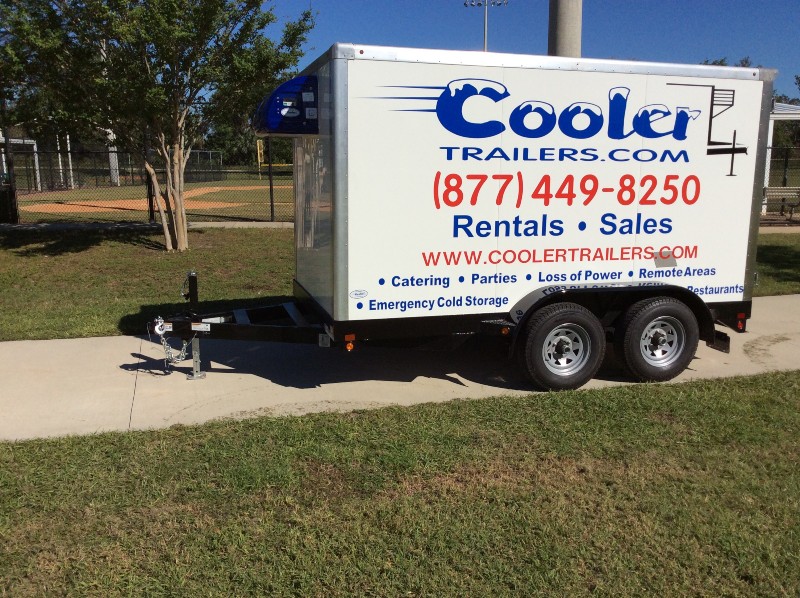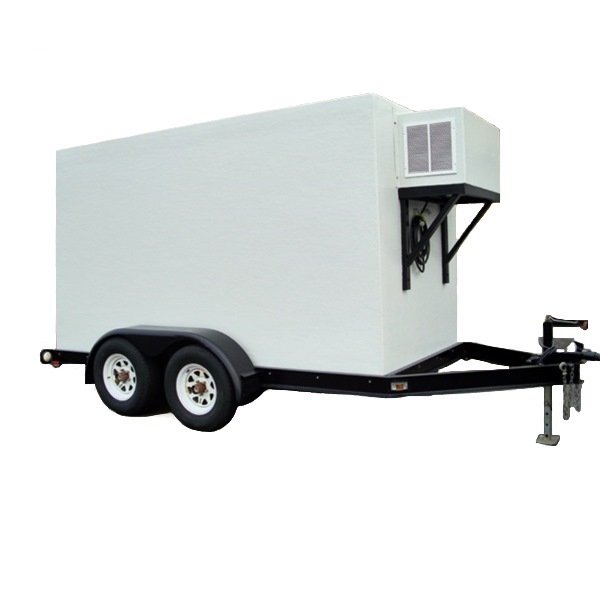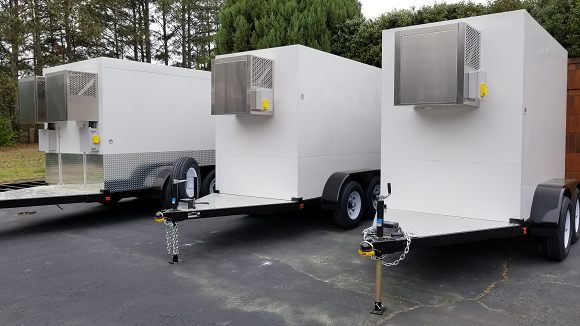Discover Small Refrigerated Trailer-Cooler Trailers: Mobile Cold Store
Discover Small Refrigerated Trailer-Cooler Trailers: Mobile Cold Store
Blog Article
The Ultimate Guide to Choosing the Ideal Refrigerated Trailers
When it comes to picking the optimal refrigerated trailer for your organization needs, various factors need to be carefully taken into consideration to make certain optimum efficiency and performance. From the various types of cooled trailers available to the essential features such as size, temperature control, and power efficiency, each aspect plays an essential function in determining the best fit for your certain requirements.
Sorts Of Refrigerated Trailers

The two primary kinds of chilled trailers are reefer trailers and protected trailers. Reefer trailers, brief for cooled trailers, are furnished with cooling down systems that proactively manage the inner temperature level to keep perishable items at the required conditions during transportation.

Dimension Factors To Consider
Thinking about the measurements of the cooled trailer is necessary to ensure optimum storage space capability and reliable transportation of subject to spoiling goods. When choosing the size of a cooled trailer, it is essential to think about the quantity of items that need to be transferred. Bigger trailers use even more storage area, making them suitable for organizations with significant delivery needs. Smaller sized trailers are much more cost-efficient and maneuverable for organizations with lower loads or minimal storage space at their facilities.
One more variable to take into consideration when identifying the size of the refrigerated trailer is the measurements of the items being transported. Some items may have specific size requirements or require to be piled in a specific manner to protect against damage. As a result, choosing a trailer size that suits the measurements of the goods will certainly assist maintain their quality during transit.

Temperature Level Control Attributes
Effective management of temperature control in refrigerated trailers is critical for protecting the top quality and security of perishable items throughout transportation. When selecting a chilled trailer, it is necessary to consider the temperature control features it provides. Look for trailers equipped with innovative temperature tracking systems that supply real-time data on the interior problems. These systems need to have specific temperature level settings and alerts for any type of discrepancies, making certain that the freight remains within the needed temperature level array.
Additionally, some cooled trailers feature multi-zone temperature level control capabilities, permitting various areas to keep differing temperature levels as needed for different types of items. When moving a mix of perishable products with unique temperature needs, this feature you could check here is specifically useful. Furthermore, trailers with reliable insulation and temperature harmony throughout the freight space help stop cold or hot spots, making sure regular conditions for all items being carried
Power Efficiency Variables
An essential aspect to assess when choosing a chilled trailer is its power efficiency, which plays a significant function in lowering functional costs and environmental impact. Energy effectiveness variables to consider include the insulation high quality of the trailer, the type of refrigeration system used, and any added attributes that add to reducing power consumption. Top notch insulation is essential as it helps keep the preferred temperature inside the trailer with minimal power loss. Modern refrigeration systems, such as those utilizing advanced technology see like electrical standby options or solar power, can likewise enhance energy efficiency. In addition, features like automatic defrost cycles, temperature level surveillance systems, and reliable airflow style can further optimize energy use. By focusing on energy-efficient chilled trailers, businesses can not only save money on operating costs however additionally decrease their carbon footprint, making a favorable payment to sustainability initiatives in the transportation market.
Maintenance and Solution Tips
Given the important function of power effectiveness in reducing functional costs, it is necessary to develop an aggressive maintenance and solution regimen for refrigerated trailers to make sure optimal efficiency and long life. Regularly maintaining the trailer and evaluating's refrigeration unit is critical. This includes inspecting the gaskets for any deterioration, guaranteeing correct insulation, and cleansing the condenser and evaporator coils. Monitoring temperature level levels and calibrating the thermostat periodically can help prevent temperature fluctuations that might jeopardize the quality of the transported products. Additionally, checking the trailer's tires, brakes, lights, and electrical systems is vital to assure safe and reputable procedure. Collaborating with a reputable provider for routine maintenance checks and attending to any go to this website concerns without delay can substantially expand the life-span of the refrigerated trailer. Implementing a thorough upkeep routine and maintaining thorough documents of all service and repairs conducted can aid in recognizing trends, optimizing performance, and decreasing unanticipated failures.

Final Thought
In verdict, choosing the most effective cooled trailer entails taking into consideration different variables such as the sort of trailer, size demands, temperature level control attributes, energy efficiency, and maintenance needs. By reviewing these aspects carefully, companies can ensure they choose a cooled trailer that fulfills their details demands and needs, inevitably causing extra efficient transport and storage of temperature-sensitive goods.
The two key kinds of cooled trailers are reefer trailers and shielded trailers (small refrigerated trailer- cooler trailers). Reefer trailers, short for chilled trailers, are outfitted with cooling systems that proactively manage the inner temperature level to maintain disposable goods at the necessary conditions during transportation.On the other hand, shielded trailers are created to keep the temperature level of the goods utilizing the insulation residential properties of the trailer walls. While they do not have energetic air conditioning systems like reefer trailers, shielded trailers are appropriate for goods that need protection from exterior temperature level variations yet do not call for as strict temperature control as perishable products.Reliable monitoring of temperature control in cooled trailers is important for preserving the quality and safety and security of perishable products throughout transportation
Report this page